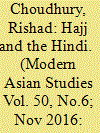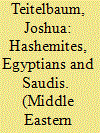|
|
|
Sort Order |
|
|
|
Items / Page
|
|
|
|
|
|
|
| Srl | Item |
| 1 |
ID:
084763


|
|
|
|
|
| Publication |
2008.
|
| Summary/Abstract |
From the mid-19th to the early 20th centuries, the forces unleashed by the age of European imperialism and its rapid encroachment on d?r al-Isl?m increasingly brought the hajj under the scrutiny and regulation of non-Muslim powers. The driving force behind these dramatic changes in administration of the hajj was the expansion of the British Empire. As Britain's power in the Indian subcontinent grew, so too did its maritime supremacy throughout the Indian Ocean basin. Looking to secure its access to India, ward off its European competitors, and expand its commercial interests in southwestern Arabia, the Red Sea, and the Gulf of Aden, Britain's role in the region was intensified by the transit opportunities that emerged with the development of regular steamship routes between the Mediterranean and India from the 1830s to the 1860s and the eventual opening of the Suez Canal in 1869. With the exponential growth of maritime traffic that accompanied these technological advances came a similarly dramatic rise in the oceangoing pilgrim traffic from and through British India. Owing to this expansion in the number of seaborne pilgrims, the hajj soon came to be recognized as the primary conduit for the globalization of epidemic diseases, such as cholera and plague.
|
|
|
|
|
|
|
|
|
|
|
|
|
|
|
|
| 2 |
ID:
109134


|
|
|
|
|
| Publication |
2011.
|
| Summary/Abstract |
The Hajj has always been affected either directly or indirectly by Iranian foreign policy. This article attempts to examine the impact of the Iranian Islamic regime's foreign policy, specifically with regard to Iranian-Saudi interaction on the Hajj, from its establishment in 1979 until 2010. Given the ideological approach dominating Iran's foreign policy, this article will illustrate how the relationship of Iran and Saudi Arabia has been especially frictive during the Hajj. However, with Iran attempting to pursue a more moderate and less confrontational foreign policy in the region and internationally, its relationship with Saudi Arabia has become cordial and peaceful of late, even during the pilgrimage.
|
|
|
|
|
|
|
|
|
|
|
|
|
|
|
|
| 3 |
ID:
149091


|
|
|
|
|
| Summary/Abstract |
This article charts several historical paths, hitherto underexplored, through the Hindi or ‘Indian’ Sufi lodges of the Ottoman empire. Focusing on the ‘long eighteenth century (circa 1695–1808)’, it tracks their remarkable ascendance as an institutional network for mobile and migrant Indian Sufi pilgrims. From Istanbul to the provinces, the article demonstrates how Naqshbandis and Qadiris on the Hajj circuit drew on local channels of social communications, legal petitioning strategies, and state and inter-state linkages to forge unique identities as ‘trans-imperial subjects’ in an age of decentralization in the Ottoman world. I argue that central to their social success was the creation of new corporate regimes of itinerant piety. But first, I place the little-known lodges at the heart of a specific shift in early modern attitudes to identity, as the story behind ‘Hindi’ beckons wider inquiry into emergent differences among Sufi pilgrims in the Ottoman empire.
|
|
|
|
|
|
|
|
|
|
|
|
|
|
|
|
| 4 |
ID:
174141


|
|
|
|
|
| Summary/Abstract |
Most analyses of the fate of the Hijaz and the Muslim pilgrimage after the First World War have focused on the struggle between Hashemites and Saudis. But in actuality the Egyptians were heavily involved in this dispute, for the Hijaz had been for centuries part of a geopolitical system based on the Red Sea littoral states. Indeed, this was a tripartite struggle, which afforded much more room for maneuver than a simple bilateral one. This article covers the maneuvers of all three parties, demonstrating how they tried to gain possession of the hajj, and all that meant for world Islamic leadership.
|
|
|
|
|
|
|
|
|
|
|
|
|
|
|
|
| 5 |
ID:
095361


|
|
|
|
|
| Publication |
2010.
|
| Summary/Abstract |
This article discusses the emergence, ideology, and activities of the Saudi Shi'a opposition group Hizbullah al-Hijaz and its clerical wing, the Tajamu' 'Ulama' al-Hijaz. The group has played a significant but little known role in Saudi-Iranian relations since 1987 following its creation as a rival to the other Saudi Shi'a opposition group, the Islamic Revolution Organization. Hizbullah al-Hijaz was pro-Iranian and followed the Marja'iyya of Ayatollahs Khomeini and Khamene'i. Although it officially denounced any engagement with the Saudi leadership, it profited from a general amnesty in 1993. After it was blamed for the Khobar Towers bombing in 1996, most of its members were arrested and its organization dismantled.
|
|
|
|
|
|
|
|
|
|
|
|
|
|
|
|
| 6 |
ID:
179118


|
|
|
|
|
| Summary/Abstract |
This article analyses how the state in Senegal has managed the hajj since the liberalisation era in the early 2000s. Although the essence of the hajj is religious, it is also deeply political and requires that the state manages complex relations with pilgrims, religious leaders, private travel agencies, politicians and Saudi authorities. This article argues that three inter-related imperatives structure the conduct of the Senegalese state: a security imperative, a legitimation imperative, and a clientelistic imperative. Security concerns lead the state to monitor and control pilgrims travelling to Mecca. Legitimation is seen in the collaborative relations with Sûfi orders and in the framing of the hajj organisation as a ‘public service’. Finally, given the magnitude of financial and symbolic resources attached to the hajj, clientelistic relations are constitutive of state officials’ actions. Overall, despite the post-2000 liberalisation of the hajj, the state has maintained its role as a gatekeeper, regulator and supervisor.
|
|
|
|
|
|
|
|
|
|
|
|
|
|
|
|
|
|
|
|
|